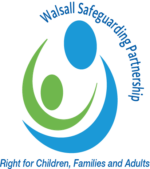Right Help Right Time
The Continuum of Need
Professionals from all agencies have a shared responsibility to keep children living in Walsall safe and to promote their welfare. We all have a responsibility to help and support children and their families and we must work together to deliver help efficiently to ensure that we are able to continue to improve the lives of children across the borough. There is a commitment to work with families in a way that builds resilience and recognises the strength in family relationships and community connections, ensuring that children and their families are supported, reducing the need for statutory intervention.
Our shared ambition as a partnership is to deliver the right help at the right time by coordinating our efforts, sharing information where appropriate to do so, and putting the child and their experience at the centre of everything we do. Our aim is to promote positive working relationships with professionals and families alike and are committed to ensuring that all children have the best start in life and are safe from harm, happy and learning well.
We firmly believe that safeguarding is everybody’s responsibility, and we should support each other in making decisions when identifying and providing an appropriate response to concerns.
In Walsall we are committed to the following values and principles:
- Collaborative – Practitioners and families are partners – we do things with people, not to them
- Aspirational – We want the best for families and use positive language and measure success
- Strengths-based – All families have strengths, and we focus on using strengths to support positive change
- Purposeful – Our role is to meet child and family needs and give families the right support, first time
- Empathic – We listen carefully to families and offer a helping hand to create change for children
- Rights-based – Families have a right to help and support for their children, and the autonomy to make choices
In this model, all services and interventions seek to work openly with the family (or with young people on their own where it is age appropriate) in order to support them to address their needs at the lowest possible level. We agree to actively work with children and families to prevent their needs escalating to a higher level. We will only request services at a higher level after we have done everything possible to meet needs at the current level. The Levels of Need table on section 3 and the continuum of need model below together illustrate how Early Help operates in Walsall and clarifies the threshold between each level. This guidance seeks to give clear advice to all professionals and the public on the levels of need and thresholds for different services and responses in Walsall. However, we recognise that each child and family member is an individual, and each family is unique in its make-up, so reaching decisions about levels of needs and the best intervention requires discussion, reflection and professional judgement.
Children and young people will move between levels of need according to circumstances, so services need to be flexible to meet need as it changes.

Definition:
No additional help and support required.
Children and young people making good overall progress in all areas of their development and receiving appropriate universal services such as health and education.
Action:
Child, young person, carer or family accesses relevant universal services for advice/support such as GP, school, dentist, family hub and voluntary sector.
Definition:
Needs likely to be met through one agency.
Children, young people and their families may need some extra help and support to reach their full potential.
Needs may relate to health, education or social development and are likely to be short term needs, families often will already be receiving support by services they know such as schools, health visitors, school nurses, voluntary and community services etc.
Action:
Offer support yourself, work with a professional partner or direct the family to relevant universal or early help support service for additional support.
An Early Help Assessment should be considered and /or Outcome Stars to understand the family’s needs further.
Definition:
Needs that require a co-ordinated multi-agency response.
Children, young people and families with identified support needs who are experiencing multiple and interconnected problems requiring a team around the family multi-agency approach of support and who meet at least 3 of the 10 Supporting Families priority needs.
Action:
Completion of the Early Help Assessment (EHA) is required.
Evidence of at least 3 of the 10 Supporting Families priorities identified.
Information of single agency support already provided should be shared.
Continue the help and support that you are providing, additional targeted work will be agreed along with roles and responsibilities as part of the team around the family meeting (TAF), should this be required.
Definition:
Needs likely to require intervention from Children’s Social Care.
Children, young people and their families who are experiencing very serious or complex needs that are having a major impact on their expected outcomes or there is serious concern for their safety, may require statutory intervention. This may be as children in need – CIN (Section 17 of the Children Act 1989) or as children in need of protection- CP (under section 47 of the Children Act 1989).
A referral should be made to MASH via the electronic Multi-Agency Referral Form (eMARF).
Action:
The eMARF, should clearly outline what you are worried about, what the impact is on the child and what work has been done to support to reduce level of need and/or risk.
If there are immediate safeguarding concerns for a child, call the police on 999.
If you need to make a referral urgently, MASH can be contacted on 0300 555 2866, Monday – Thursday 08.45-17.15, and Friday 08.45-16.45.
If you need to report a concern about a child outside of office hours, contact can be made with the Emergency Duty Team (EDT) on 0300 555 2922.

